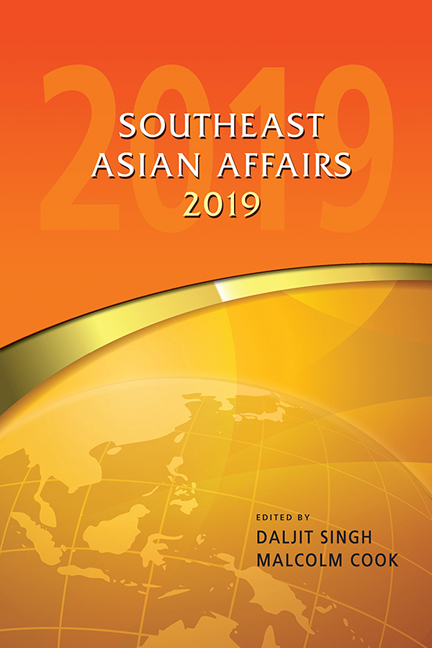Indonesia in 2018: The Calm before the Election Storm
from INDONESIA
Published online by Cambridge University Press: 07 September 2019
Summary
The year 2018 marked twenty years since the resignation of Soeharto and the onset of democratic reform in Indonesia. In 1998, Indonesia's leaders faced an ailing economy rife with corruption, domestic instability and student protests, with predictions of “Balkanization” amidst threats of separatism. Today, it is worth reflecting on the state of the country as a relatively consolidated democratic system with a separate police force and vibrant press, particularly when compared to other Southeast Asian states. It is inevitable that today's achievements are weighed against Indonesia's previously dire circumstances, having emerged from the East Asian financial crisis and domestic political turmoil. At the same time, Indonesia's progress is also measured by the hopes and expectations of Indonesians (for those not too cynical) that their new leaders will transcend some of the most odious features of the Soeharto regime. Seen in that light, the country's democratic shine is tarnished by the seemingly never-ending high-profile corruption cases and entrenched money politics. The year saw the jailing of former speaker of the House of Representatives and former Golkar chair Setya Novanto for stealing US$170 million (2.3 trillion rupiah) of public monies.
The year was also a last push for the incumbent president to prove that his programme of national development had made significant gains. In 2018 the key task of President Joko Widodo (Jokowi) was to keep the country on an even keel leading up to the 2019 presidential election. He faced a number of domestic challenges, from the Surabaya terrorist attacks, which saw children being used in suicide bombings for the first time, to the slew of major natural disasters in the second half of the year. The economy was rocked by volatile oil prices and the fallout from a trade war between the world's largest economies, the United States and China, which led to the precipitous fall of the nation's currency. What follows is an overview of the key trends and major developments that shaped the largest state in Southeast Asia in 2018. The first section discusses the significance of Ma'ruf Amin as Jokowi's running mate and what it reveals about the prevailing political environment.
- Type
- Chapter
- Information
- Southeast Asian Affairs 2019 , pp. 123 - 144Publisher: ISEAS–Yusof Ishak InstitutePrint publication year: 2019

